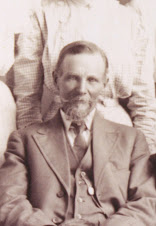
HISTORY OF ROBERT LINDSAY
Robert Lindsay was the eldest son of William Lindsay and Christina Howie. He was born at Gatehead, Kilmaurs, Ayrshire, Scotland; April 19, 1845. He was born of poor but honest parents, his father being a coal miner by vocation. He had very little schooling and started to work regularly in the coal mines when about ten years of age. This was very hard work for boys, as well as men, and they had to work very long hours. In the winter season, when the days were short, they seldom saw daylight except on Sunday. So, of course, they appreciated the Sabbath very much, as on that day they went to church instead of going down the mine.
On the 17th of October, 1861, his father was killed by a large stone falling on him while at work in the Station pit near Kilmarnock, Ayrshire, Scotland. The family was left in a very sad condition. Eight children were left without a father, who had been a good provider and a kind and affectionate parent to his family. There were four of the boys working in the coal mines at the time, three besides himself. They were William, James and Samuel, but they were all too young to dig coal so they had to work as helpers, with other men, as long as they remained in Scotland.
His parents had joined the Church of Jesus Christ of Latter-Day Saints in May of 1848, and had a great desire to come to Utah. His father had been paying small sums into the emigration fund, with the end in view that he might come to Utah, then try to raise means to send for his family later. His death, of course, seemed to put an end to the thought of ever getting to Utah.
His mother’s faith was good and her courage strong. She said to her children, even when their hopes seemed to be blasted, “Never mind boys, we will go to Zion yet, next spring, and on the very first ship.” Her words came true. The Church came to their aid and provision was made for the whole family to leave together. A letter came with this information, giving them only three to four days’ notice and telling them to sell all they had and get to Liverpool by the 20th of April, 1862. This they gladly did, leaving their home on the 19th, which was Robert’s 17th birthday. They reached Liverpool the next day, going from Glasgow on a small steamboat and having their first experience with sea-sickness.
They went on board the sailing ship “John J. Boyd”, 700 passenger capacity, bound for New York. They sailed from Liverpool on the 22nd of April. They had a fairly good passage over the Atlantic. One quite bad storm occurred but no great damage was done. A sea voyage in those days on a sailing ship, tossed by the wind, with poor food and water, and much sea-sickness, was somewhat of a hardship for all.
They landed in New York on the 4th of June, all glad to be on land once more, and especially the land of Zion.
It took ten days at that time to get from New York to Florence, Nebraska, where the teams from Utah would meet and take them across the plains. They had but little to eat coming from New York to Florence. Here the Church had a store where they could get all the food needful. They had to lay over here some seven weeks waiting for the ox teams and their drivers. The season had been late and the rivers very high.
They were assigned to a wagon driven by John Turner of Heber, and they crossed the plains in Homer Duncan’s company, spending two months on the way. This was their first introduction to Bull Whackers and ox teams. But they soon got used to the cracking of the whips and the whoa, hawing and geeing of the teamsters. It was still harder to learn to cook in the bake skillet and frying pan over a fire made of sticks, when they were available, and buffalo chips when they could get nothing better. Flour and bacon were about all they got to cook and everybody had to walk.
The family came right into Heber, arriving September 21, 1862. Robert was hired out to work one year for one hundred dollars in wheat, at two dollars per bushel. He worked for several years for different persons, at all kinds of work, and finally got a team and wagon of his own.
He married Sarah Ann Murdock December 15, 1868, in the Endowment House in Salt Lake City. They went on their wedding tour with an ox team. He took up a homestead on Lake Creek, where he lived the rest of his life with the exception of his filling a short mission to Australia in 1887 and 1888.
He was a Sunday School teacher for many years. Also a High Priest and High Councilor up to the time of his death.
He was a hard working man and did his full share in all public enterprises for the building of the county and town of Heber and vicinity. He was of a generous, kindly disposition and made friends wherever he went. He was the father of sixteen children and labored hard to provide for them, make them comfortable and happy, and to teach and train them in the ways of truth and righteousness. Few men have done more real hard work in grubbing sage, clearing and fencing land, making water ditches and building comfortable homes.



No comments:
Post a Comment